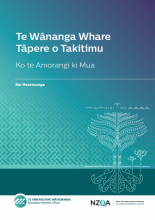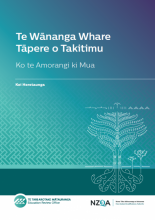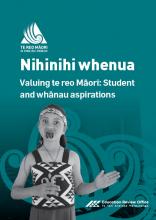- Topics: Employment practices, Mathematics, Pacific learners, Te Pou Mataaho | Evaluation and Research Māori, Te Whāriki
- Published: 19 Jan 2021
Te Kahu Whakahaumaru – Ngā mahi a te rangai mātauranga Māori (English)
Te Pou Mataaho, ERO’s evaluation and research group, and Te Uepū ā Motu, ERO’s national evaluation and review team, pursued this evaluation to provide an evidence base about the initial impacts of Covid-19 on Māori-medium education and how the sector responded.
- Published: 19 Jan 2021
Te Kahu Whakahaumaru – Ngā mahi a te rangai mātauranga Māori (Māori)
I whāia tēnei arotake e Te Pou Mataaho, te rōpū arotake, rangahau hoki a Te Tari Arotake Mātauranga me Te Uepū ā-Motu, te rōpū arotake ā-motu a Te Tari Arotake Mātauranga, ki te whakaputa i tētahi kohinga taunakitanga e kitea ai ngā pānga tōmua o te Mate Korona ki te rāngai mātauranga reo Māori, me ngā rautaki i whāia ai e taua rāngai.
- Published: 10 Dec 2020
Te Kahu Whakahaumaru: Māori continue to show resilience across Māori-medium education
In Aotearoa, Māori-medium education experienced significant disruption when the outbreak of Covid-19 forced kura to close their doors, and whānau and kaiako to adjust to home schooling and distance learning. Among the many challenges were access to technology and resources with Māori communities among the most affected.
- Published: 10 Dec 2020
E whakatinana tonu nei te rāngai mātauranga reo Māori i te manawanui
I Aotearoa nei, i tino raru te rāngai mātauranga reo Māori i te horapatanga o te Mate Korona, i kati ai ngā tatau o ngā kura, i mate ai hoki ngā whānau me ngā kaiako ki te tīni i ā rātou mahi ki te whakaako ki te kāinga me te ako tawhiti.
Ko tētahi raru i roto i te huhua, ko te korenga o ngā taputapu matihiko me ngā rauemi, ka mutu ko ngā hapori Māori ērā i rongo i te korekore rawa atu nei.
- Published: 15 Sep 2020
Nihinihi Whenua – Valuing te reo Māori: Student and whānau aspirations
This report provides a snapshot of student and whānau perspectives on the teaching of te reo Māori. It follows the June publication of Te Tāmata Huaroa, which provides a review of the current status of te reo Māori in English medium school settings.
- Published: 18 Jun 2020
Te Tāmata Huaroa: Te Reo Māori in English-medium Schooling
This report gives a snapshot of the current provision of te reo Māori teaching and learning in a representative sample of English-medium primary and secondary schools. The education sector is seen as an important lever in the Government’s Maihi Karauna strategy for language revitalisation.
- Published: 12 Dec 2019
Te Whāriki (2017): Awareness Towards Implementation
ERO’s final report in the Te Whāriki series summarises the findings of previous reports and includes the last two focus areas for the curriculum – how services decide ‘what learning matters here’ and how well they were developing learning-focused partnerships with parents and whānau.
- Published: 27 Jun 2019
Preparedness to implement Te Whāriki (2017)
ERO is undertaking a series of evaluations on the implementation of Te Whāriki: He whāriki mātauranga mō ngā mokopuna o Aotearoa. This report examines how prepared services are to implement Te Whāriki, including their engagement with professional learning and development, and determining 'what matters here' and next steps.
- Published: 15 Nov 2018
Engaging with Te Whāriki (2017)
New Zealand’s early childhood curriculum, Te Whāriki, was updated in April, 2017. Te Whāriki (2017) reflects the changes in theory, practice and early learning contexts that have occurred over the last 20 years. ERO is undertaking a series of evaluations focused on the implementation of Te Whāriki in early learning services from mid-2017 until the end of 2019.
- Published: 12 Jul 2018
Awareness and confidence to work with Te Whāriki (2017)
In this evaluation, ERO wanted to find out how aware and confident leaders and kaiako in early learning services were as they began to work with the updated curriculum, Te Whāriki (2017).
- Published: 20 Feb 2018
Teaching strategies that work - Mathematics
This Education Review Office (ERO) report is one of a series of reports on teaching strategies that work. It features strategies and approaches that we observed in 40 primary schools selected from across New Zealand. These schools came from a database of 129 schools, all with rolls of 200 or more, in which the proportion of students in the upper primary years (Years 5 to 8) achieving at or above the national standard had increased. In each case achievement levels were also above average for the decile.
- Published: 31 Oct 2016
Early Learning Curriculum
This retrospective study synthesises findings from 17 national reports about curriculum implementation in early learning services, published over the last 10 years.
- Published: 22 Mar 2016
Early mathematics: a guide for improving teaching and learning
This guide describes how children can be supported to become confident and capable mathematical learners in the early years.
- Published: 08 May 2014
Improving quality - employment responsibilities in kindergartens and education and care services
This report discusses the effectiveness of employment practices in some kindergartens and education and care services.
- Published: 01 Nov 2013
Priorities for Childrens Learning in Early Childhood Services: Good Practice
This good practice report presents examples from five early childhood services where priorities for children’s learning were well considered and reflected on.
- Published: 01 Nov 2013
Making Connections for Pacific Learners' Success
This report discusses secondary schools where Pacific learners are achieving at or above the national norms for all students. It includes details of initiatives and good practice and how these work together to get great results.
- Published: 16 Jun 2013
Stories of Resilience and Innovation in Schools and Early Childhood Services Canterbury Earthquakes 2010-2012
This national report gives an insight into what Canterbury schools and early childhood services experienced during and after the earthquakes. It tells their stories and gives good advice about emergency planning for others in the education sector.
- Published: 27 May 2013
Priorities for Children's Learning in Early Childhood Services
This national report is one of two reports that present the findings of a 2012 national evaluation about curriculum priorities.













